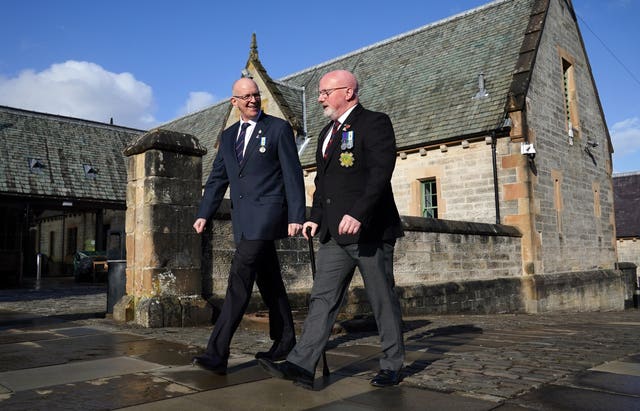Two veterans, whose paths crossed when fighting during the Falklands war, have been reunited four decades later.
Bill McDowell, 60, and Norman McDade, also 60, met for the first time since the 1982 conflict at a home in Bishopton, which is run for veterans by charity Erskine.
The pair, who both now live in Erskine, likely came across each other during a transition of British troops on to ships heading into battle during the Falklands.
They decided to reunite to mark the war’s 40th anniversary on Saturday.
Mr McDade, who prefers to go by the name Mac, joined the Royal Navy aged 17 in 1978 and trained as a chef.
But when war broke out between the British and the Argentines, Mac and his crew onboard the HMS Plymouth were ordered to head to the South Atlantic to fight.
When not dodging bombs and defending troops against fighter jets, the Navy chef-turned gunner was involved in assisting in the transportation of soldiers arriving from the UK onto ships going into battle.
On May 27, the Queen Elizabeth 2 (QE2) arrived in South Georgia carrying the 5th Infantry Brigade, including Mr McDowell, who was a member of the Scots Guards.
The troops were then transferred to smaller ships, including the Plymouth and HMS Intrepid, to be transported on to East Falkland.
This is where the two were believed to have come across each other for the first time.
“There is definitely a possibility we waved at each other or saw each other at this point,” Mac said.
“It’s not always easy to recognise everyone because we all look a little different now, most of us certainly have less hair.”
Speaking about his memory of the transfers between boats, Mr McDowell said he was “reduced to tears” on several occasions.
“In the boats most of us were crouching, kneeling or sitting in icy water which gathered in the bottom, at times it was so cold that I could barely hold my rifle,” he said.

“There were several ship-to-ship transfers, as the QE2 could not be put at risk.”
He said on June 5, the troops embarked the HMS Intrepid, which was an amphibious assault ship used by the Royal Marines and headed to Bluff Cove.
“It was from HMS Intrepid that we were launched, crammed into a couple of landing crafts for what could only be described as a night of freezing cold and wet hell.
“The whole night was spent in the bitter freezing cold, pitch black, South Atlantic winter.
“At one point during the night, shells burst over the landing crafts, shells which were fired from Royal Navy warships that were unaware that the battalion was in the landing crafts and came very close to identifying us as enemy and opening fire.
“The flat-bottomed ships were tossed mercilessly in the waves and every time the boats bow came crashing down, the freezing cold water would come pouring into the boat and rushing over – there would be a collective gasp as the water hit us.”
When 2nd Battalion Scots Guards landed at Fitzroy, a settlement on East Falkland, on June 6, Mr McDowell and his comrades then went on to fight in the Battle of Mount Tumbledown a week later.
On June 13, the bloody conflict, with hand-to-hand fighting, led to the deaths of nine Scots Guards troops and 47 wounded.
“I still find it difficult to talk about the moments that changed my life forever,” Mr McDowell said.
“I was confused, scared and a long way from home.”




Why are you making commenting on The Herald only available to subscribers?
It should have been a safe space for informed debate, somewhere for readers to discuss issues around the biggest stories of the day, but all too often the below the line comments on most websites have become bogged down by off-topic discussions and abuse.
heraldscotland.com is tackling this problem by allowing only subscribers to comment.
We are doing this to improve the experience for our loyal readers and we believe it will reduce the ability of trolls and troublemakers, who occasionally find their way onto our site, to abuse our journalists and readers. We also hope it will help the comments section fulfil its promise as a part of Scotland's conversation with itself.
We are lucky at The Herald. We are read by an informed, educated readership who can add their knowledge and insights to our stories.
That is invaluable.
We are making the subscriber-only change to support our valued readers, who tell us they don't want the site cluttered up with irrelevant comments, untruths and abuse.
In the past, the journalist’s job was to collect and distribute information to the audience. Technology means that readers can shape a discussion. We look forward to hearing from you on heraldscotland.com
Comments & Moderation
Readers’ comments: You are personally liable for the content of any comments you upload to this website, so please act responsibly. We do not pre-moderate or monitor readers’ comments appearing on our websites, but we do post-moderate in response to complaints we receive or otherwise when a potential problem comes to our attention. You can make a complaint by using the ‘report this post’ link . We may then apply our discretion under the user terms to amend or delete comments.
Post moderation is undertaken full-time 9am-6pm on weekdays, and on a part-time basis outwith those hours.
Read the rules here